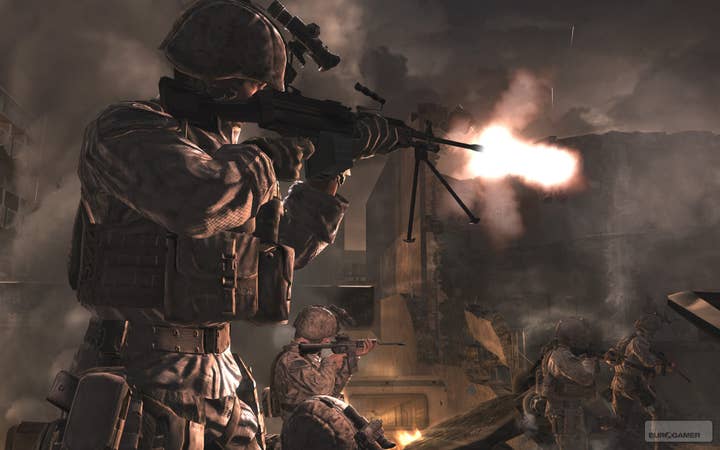Internal Warfare
The mainstream press doesn't care for any "controversy" in this year's Call of Duty; so why are gamers themselves so riled about it?
Modern Warfare 3's tourist scene is quite a different beast to No Russian, of course. For a start, it's non-interactive - pure scene setting, in which you're watching people get killed by your terrorist enemies rather than participating in the attack yourself. A few years ago, that wouldn't have stopped the press from branding MW3 a sick game in which you kill children, and to hell with accuracy, but attitudes and press focus have moved on.
I sometimes wonder, though, if it's the very scene-setting nature of these controversial episodes which really gall some of the harsh critics within the gaming world. There's still a hardcore cadre out there of people who fundamentally object to the idea of videogames as a storytelling medium - a group who feel that games should purely be rule-based skill entertainment, and that narrative should be nothing other than a light dab of glue to hold together that framework. In the complaints from gamers and games writers about controversial scenes, I sense a hint of the same attitude which leads people to come out with daft, embittered lines like "if you want a story, read a book".
The reality, of course, is that when we talk about games like Modern Warfare, we're not talking about particularly great stories. No Russian and the tourist scene in MW3 don't justify themselves by being crux points in great works of literature. They don't need to, though; they function perfectly well as scene setting in daft action games.
Why do gamers themselves feel the need to hold games to a higher standard?
Did anyone react with anything more than a snort of derision when the last Rambo movie set its scene with the heavy handed on-screen massacre of peaceful villagers, or the painfully clunky "revelation" that the commander of the enemy forces was a nasty paedophile? There wasn't the slightest outcry, just as there hasn't been to similar techniques in countless other action movies of recent years. They're just part of the framework of how action movies work, a narrative device that tells you why you're about to watch half an hour of stylishly choreographed killing. Or half an hour of Sylvester Stallone sweating copiously and lumbering ponderously around a scene with a bow and arrow, if that's more your thing.
Why, then, do gamers themselves feel the need to hold games to a higher standard? Have we simply been so burned by controversies past that we feel the need to be the first to jerk our knees, to get in there first before the Daily Mail does it for us? Do we feel that our hobby is being "polluted" by this kind of narrative device in some way? Are we really going to demand that action games must be works of literary intelligence, while action movies or TV series are allowed to be nothing other than dumb fun?

It's good that gamers and the games media can think critically about the medium, of course - it's a vital step in the development of videogames as part of the tapestry of media. Yet that's not quite what's happening here. The debate over violence in videogames should happen in the context of a broader development of an awareness of how games tell their stories, set up their scenes, engage their players, and tackle (or miserably fail to tackle) the social issues they run into into the process. That's a discussion and an awareness that will yield interesting answers and eventually deliver better games, just as the analytical approach to TV and film has, over the years, created a body of learning and understanding that enables modern creatives to knowingly challenge and undermine the rules and hence, the expectations of their audiences.
That's a process that needs to happen, and one that is happening all too slowly. But let's not kid ourselves - doing the knee-jerk work of the Daily Mail for them isn't a step in the right direction. We should broaden the debate around videogames and their content, but that should come hand in hand with a solid defence of the medium's right to exploit the same tools and ideas which film, TV and other media have been using without comment for years. The irony, right now, is that we probably wouldn't even need that defence if the medium wasn't under attack from within.
